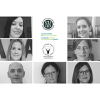5 April 2021
Dementia and COVID: What Families and Physicians Should Know
Early in the pandemic, neurologists expressed concern that COVID-19 patients with dementia may be at higher risk for complications and mortality. But those fears have not been realized, according to a new study of patients who were hospitalized with COVID-19 during the first wave of the pandemic in New York City. The study, led by James Noble, MD, MS, and Amro Harb, a Vagelos medical student, was published this month in JAD.
31 March 2021
Dementia Death Risk is Higher Among the Socioeconomically Deprived
A large proportion of dementia deaths in England and Wales may be due to socioeconomic deprivation, according to new research led by Queen Mary University of London. The team also found that socioeconomic deprivation was associated with younger age at death with dementia, and poorer access to accurate diagnosis. Dementia is the leading cause of death in England and Wales, even during the COVID-19 pandemic, and is the only disease in the top ten causes of death without effective treatment.
2 March 2021
Needs of Dementia Family Caregivers in Spain During the COVID-19 Pandemic
Recent confinement in the context of COVID-19 pandemic has been a challenge for people with dementia (PwD) and their caregivers. The study was motivated because all the attention to the consequences of confinement was focused on the institutional setting and few spoke about what happened to those people with dementia and their caregivers who lived at their homes in the community. The authors designed a survey with the main objective of knowing the needs of the caregivers in order to subsequently offer solutions to the problems detected in this context of care.
26 February 2021
New Research Finds Exercise May Help Slow Memory Loss for People Living with Alzheimer’s Dementia
Promising new research shows aerobic exercise may help slow memory loss for older adults living with Alzheimer’s dementia. ASU Edson College of Nursing and Health Innovation Professor Fang Yu led a pilot randomized control trial that included 96 older adults living with mild to moderate Alzheimer’s dementia. Participants were randomized to either a cycling (stationary bike) or stretching intervention for six months. Using the Alzheimer’s Disease Assessment Scale-Cognition (ADAS-Cog) to assess cognition, the results of the trial were substantial. The six-month change in ADAS-Cog was 1.0±4.6 (cycling) and 0.1±4.1 (stretching), which were both significantly less than the expected 3.2±6.3-point increase observed naturally with disease progression.
24 February 2021
Researchers Find New Way to Diagnose Potential for Alzheimer’s Disease
Early diagnosis of Alzheimer’s disease has been shown to reduce cost and improve patient outcomes, but current diagnostic approaches can be invasive and costly. A recent study, published in the Journal of Alzheimer’s Disease, has found a novel way to identify a high potential for developing Alzheimer’s disease before symptoms occur.
16 February 2021
Spinal Fluid of People with Alzheimer’s Risk Gene Signals Inflammation
People who have a gene variant associated with an increased risk of developing Alzheimer’s disease also tend to have changes in the fluid around their brain and spinal cord that are detectable years before symptoms arise, according to new research from Duke Health.
8 February 2021
Research Establishes a New Method to Predict Individual Risk of Cognitive Decline
The early prognosis of high-risk older adults for amnestic mild cognitive impairment (aMCI), using noninvasive and sensitive neuromarkers, is key for early prevention of Alzheimer’s disease. A recent study, published in the Journal of Alzheimer’s Disease, by researchers at the University of Kentucky establishes what they believe is a new way to predict the risk years before a clinical diagnosis. Their work shows that direct measures of brain signatures during mental activity are more sensitive and accurate predictors of memory decline than current standard behavioral testing.
8 February 2021
Air Pollution Poses Risk to Thinking Skills in Later Life, a Study Says
Exposure to air pollution in childhood is linked to a decline in thinking skills in later life, a study suggests. A greater exposure to air pollution at the very start of life was associated with a detrimental effect on people’s cognitive skills up to 60 years later, the research found. Researchers at the University of Edinburgh tested the general intelligence of more than 500 people aged approximately 70 years using a test they had all completed at the age of 11 years.
3 February 2021
Psychological Distress of Lockdown in Pre-Dementia Patients Prolonged During the COVID-19 De-Escalation
The effects of the lockdown decreed to deal with the COVID-19 pandemic on the mental health of elderly people in pre-dementia stages were protracted during the de-escalation phase. This is highlighted by a study published in the Journal of Alzheimer's Disease, led by researchers from the Hospital del Mar Medical Research Institute (IMIM) and doctors from Hospital del Mar, as well as researchers from the CIBER on the Physiopathology of Obesity and Nutrition (CIBEROBN) and the CIBER on Fragility and Healthy Ageing (CIBERFES). The work was carried out in collaboration with the Barcelona βeta Brain Research Center (BBRC).
2 February 2021
Dementia Rates Higher in Men with Common Genetic Disorder Haemochromatosis
New research has found that men who have the Western world’s most common genetic disorder are more likely to develop dementia, compared to those without the faulty genes. Researchers at the University of Exeter and the University of Connecticut have previously found that men with two faulty genes that cause the iron overload condition haemochromatosis are more likely to develop liver cancer, arthritis and frailty, compared to those without the faulty genes. Now, the team’s new analysis has found that men who carry the two faulty genes that cause haemochromatosis are more likely to develop dementia than men who do not carry any copies of the faulty gene.
















